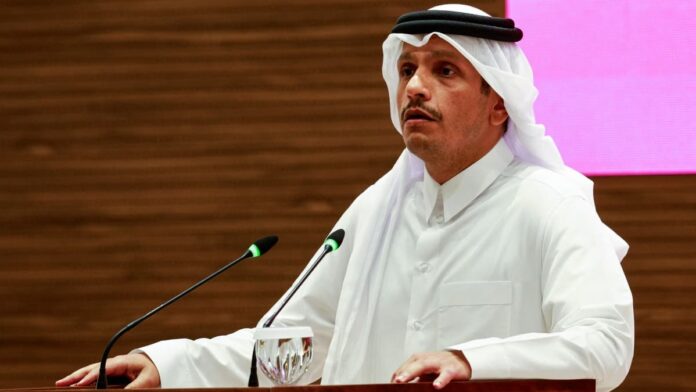As Israeli impunity is normalized on the international stage, Qatar breaks ranks and demands an end to the “double standards” applied to Israel. Just ahead of a key Arab-Muslim summit in Doha, this call marks a clear geopolitical escalation—and perhaps, the beginning of an overdue reckoning.
Qatar breaks ranks ahead of crucial summit
On the eve of an emergency summit gathering Arab and Muslim leaders in Doha, Qatari Prime Minister Mohammed bin Abdulrahman Al-Thani directly accused the international community of maintaining double standards with Israel, urging sanctions and accountability.
His words were blunt and unambiguous: “The time has come for the international community to stop the double standards and punish Israel for all the crimes it has committed.”
This shift in tone comes as U.S. Secretary of State Marc Rubio visits Jerusalem to reaffirm unconditional American support for Israel, underscoring, once again, the entrenched asymmetry in global diplomatic responses.
A growing coalition against hypocrisy
Qatar is far from isolated in its stance. In recent months, Algeria has openly condemned what it called Israel’s “institutionalized impunity,” accusing Western powers of trading international law for political convenience. Malaysia and Indonesia, traditionally vocal in Muslim diplomacy, denounced the “aggressor’s privilege” afforded to Israel by global institutions. Even Jordan, long considered a moderate buffer state with existing security agreements with Israel, issued strong condemnations following the Rafah strikes. In this context, Qatar’s entrance into this bloc gives the diplomatic rupture new weight and urgency.
Israeli strike in Doha: the line is crossed
The September 9 Israeli airstrike, allegedly targeting Hamas officials, hit a residential compound in Doha, killing five Hamas members and a Qatari security officer. According to Hamas, the intended targets survived, but the message sent was unmistakable: no state, not even a mediator, is safe from Israeli extraterritorial operations.
This marked a historic first—a direct Israeli military action inside a GCC country, triggering sharp reactions across the Gulf and beyond.
A united Arab response?
The summit convened in Doha has attracted heavyweight attendees: Palestinian President Mahmoud Abbas, Iranian President Massoud Pezeshkian, Iraqi Prime Minister Mohamed Shia’ Al-Sudani, and Turkish President Recep Tayyip Erdogan have all confirmed participation. All eyes now turn to Saudi Crown Prince Mohammed bin Salman, whose potential attendance would signal a rare moment of pan-Gulf solidarity, despite his discreet visit to Qatar earlier in the week.
A resolution condemning the Israeli strike is expected, but more significantly, the summit may represent a coordinated Arab-Muslim response to Israel’s extraterritorial aggression, breaking years of passive accommodation.
The Gulf’s security illusions are fading
For decades, the Gulf monarchies relied on U.S. guarantees to shield them from foreign aggression. But in the aftermath of the Doha strike, those assurances seem as hollow as the diplomatic statements that followed. As Elham Fakhro of Chatham House points out, “This is the first time in history that Israel has directly violated the sovereignty of a GCC state.”
The strike revealed a fragile reality: Washington’s security umbrella only stretches where it suits its strategic interests. And when an ally like Qatar is attacked, silence, not solidarity, prevails.
America’s leverage, America’s indifference
Political analyst Karim Bitar articulates a hard truth: “Only the United States has the leverage to force Israel to change its behavior.” But America won’t act unless pressure comes from its own allies. As long as the Gulf states remain fragmented and economically dependent on U.S. patronage, Washington has no incentive to modify its stance.
Israeli exceptionalism is thus sustained not just by American protection, but by Arab incoherence.
The mask of impunity begins to slip
By denouncing the double standards applied to Israel, Qatar is not merely defending its borders—it is challenging a deeply embedded geopolitical bias. The question is no longer whether Israel enjoys immunity, but how long that immunity will be tolerated.
The Doha summit may prove a decisive moment—or merely another diplomatic mirage. But what’s clear is that the era of complicit silence may finally be cracking.



